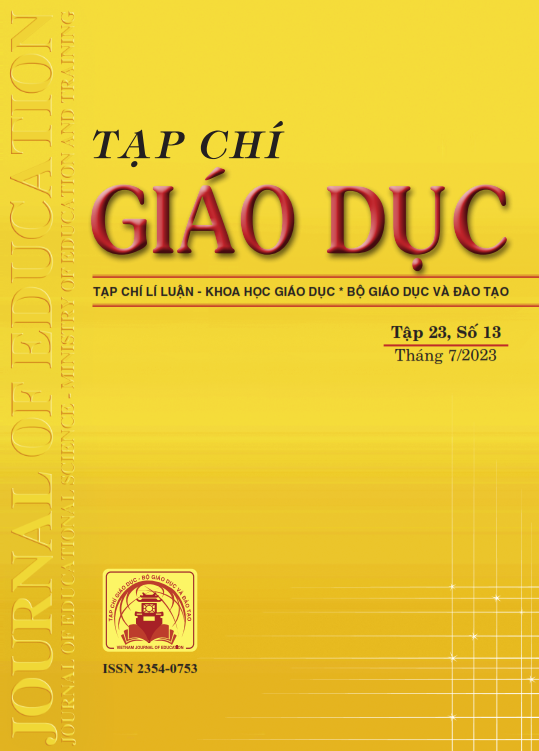Một số khuyến nghị về vấn đề phát triển nguồn nhân lực chất lượng cao phục vụ công cuộc Cách mạng công nghiệp lần thứ tư ở Việt Nam
Tóm tắt
Given the impact of the fourth Industrial Revolution (Industry 4.0), Vietnam's workforce faces many challenges in developing its socio-economic integration towards globalization, not only in terms of professional skills but also in the readiness of the domestic industry. This article discusses the requirements for developing high-quality human resources, education, and training to meet the needs of Industry 4.0. Firstly, the article evaluates the readiness of the current workforce and industrial system in Vietnam as relatively limited. Specifically, while the individual skills of workers to meet the demands of Industry 4.0 are at a low to medium level, over 87% of Vietnamese enterprises are found to be not ready for Industry 4.0. Secondly, the article identifies some criteria for developing human resources at both macros (17 criteria) and micro (individual skills) levels as necessary for the fourth revolution. These criteria are assessed based on (i) the practical needs of businesses; (ii) the specific context of Vietnam; and (iii) the current theoretical framework for human resource development. Accordingly, the study proposes some core requirements for developing human resources, education, and training systems in the upcoming period to adapt to Industry 4.0, including (i) policy coherence at the national policy level; (ii) practical efficiency in organizing and connecting relevant parties; and (iii) the development of individual skills for the workforce.
Tài liệu tham khảo
Alagaraja, M., & Githens, R. P. (2016). Capacity and capability building for national HRD: A multi-level conceptual framework. Human Resource Development Review, 15(1), 77-100. https://doi.org/10.1177/1534484315623908
Batchkova, I. A., Popov, G. T., & Belev, Y. A. (2018). Assessment of readiness for “Industry 4.0”. International Scientific Journal “Industry 4.0”, 3(6), 288-291. https://stumejournals.com/journals/i4/2018/6/288.full.pdf
Becker, G. S. (1964). Human Capital: A Theoretical and Empirical Analysis, with Special Reference to Education. University of Chicago Press.
Euler, D. (2021). Human resources development readiness in ASEAN: regional report.
General Statistics Office [GSO]. (2022). Báo cáo điều tra lao động việc làm, 2019-2021 (Employment survey report, 2019-2021). Publish house General Statistics Office, Vietnam.
Hecklau, F., Orth, R., Kidschun, F., & Kohl, H. (2017). Human resources management: Meta-study-analysis of future competences in Industry 4.0. Paper presented at the Proceedings of the International Conference on Intellectual Capital, Knowledge Management & Organizational Learning.
Niên giám thống kê [GSO]. (2022). Niên giám thống kê cấp tỉnh, 2002-2020.
Tien, N. H., & Anh, D. B. H. (2019). High quality human resource development approach of Vietnamese enterprise. International Journal of Multidisciplinary Research and Development, 6(8), 80-83. https://www.academia.edu/download/63457753/6-6-37-41020200528-78393-mcqy4v.pdf
Trần Quang Tuyến, Phạm Hiệp Hùng, Lê Văn Đạo (2020). Đánh giá hiệu quả hệ thống giáo dục Việt Nam: chỉ dụng chỉ số FP. Tạp chí Giáo dục, 471, 4-11.
Tran, T. Q., & Vu, V. H. (2020). Wage earning differentials by field of study: Evidence from Vietnamese university graduates. International Journal of Educational Development, 78, 102271. https://doi.org/10.1016/j.ijedudev.2020.102271
Tran, T., Thanh, H. T., Van Le, D., Phuong, T. T. T., & Lan, P. N. (2022). Does government financial support decrease the inefficiency of public universities? A decomposition approach. Finance Research Letters, 47, 102651. https://doi.org/10.1016/j.frl.2021.102651
UNESCO (2023). Navigate SDG4 indicators in the new UIS browser! http://sdg4-data.uis.unesco.org/
Vietnam Academy of Social Sciences [VASS], MPI, & UNDP. (2019). Productivity and Competitiveness of Viet Nam’s Enterprises. Volume 1: Manufacturing. Retrieved from Hanoi: https://www.undp.org/sites/g/files/zskgke326/files/migration/vn/PandC-Full-E.pdf
World Bank (2019). The Digital Economy in Southeast Asia: Strengthening the Foundations for Future Growth: https://documents1.worldbank.org/curated/en/328941558708267736/pdf/The-Digital-Economy-in-Southeast-Asia-Strengthening-the-Foundations-for-Future-Growth.pdf
World Bank (2020). Improving the Performance of Higher Education in Vietnam: Strategic Priorities and Policy Options: World Bank. https://documents1.worldbank.org/curated/en/347431588175259657/pdf/Improving-the-Performance-of-Higher-Education-in-Vietnam-Strategic-Priorities-and-Policy-Options.pdf
Tải xuống
Đã Xuất bản
Cách trích dẫn
Số
Chuyên mục
Giấy phép

Tác phẩm này được cấp phép theo Ghi nhận tác giả của Creative Commons Giấy phép quốc tế 4.0 .












